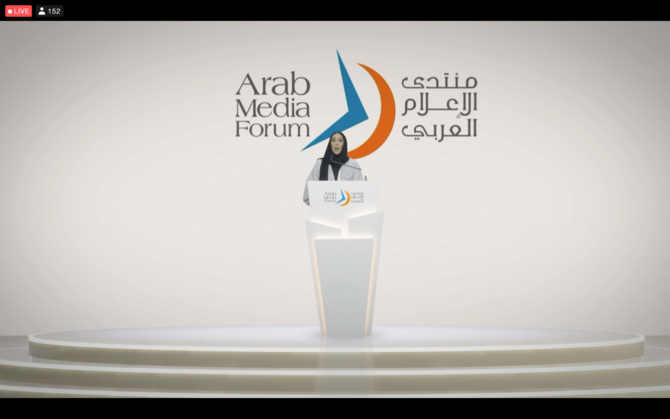LONDON: The 19th edition of the Arab Media Forum kicked off on Wednesday with an unprecedented virtual conference — the first since its launch in 2001 — due to the coronavirus pandemic.
Regional and international media experts and commentators came together virtually to discuss obstacles and issues facing the industry, with the main theme focusing on the media’s performance and future in the wake of a global pandemic that began almost a year ago.
In a conference spanning nearly two and a half hours, sessions included “The Arab Media and Geopolitical Changes,” “The Future … Digitized,” and “The Middle East: New Trajectories.”
Merrill Brown, founder and CEO of the News Project, summed up the impact of the pandemic on the industry, saying that 60,000 journalism-related jobs have been lost since the coronavirus outbreak.
“We need solutions to rescue journalism,” he said.
In a live streamed video from his Cairo office, Egyptian Prime Minister Mostafa Madbouly, the keynote speaker, highlighted challenges facing media in the Middle East and the world, warning that mass disinformation campaigns have plagued the region as terrorism has proliferated across Arab countries.
Egypt’s Information Minister, Osama Heikal, said that the coronavirus crisis has paved the way for widespread disinformation across all media platforms.
“As a result of the negative impact of recent global challenges, media has become a very important sector,” he said.
“The media has a great role and we must use it as a means to channel the real morals and ethics of nations in order to avoid their deviation to terrorism and raise their awareness.”
Discussing the digital future of media, Reuters President Michael Friedenberg said that combating the proliferation of misinformation is hugely important.
“Tackling fake news is crucial and news organizations have a great responsibility to provide true information to help the public during this crisis.”
He added: “Everyone should recognize our role in society to combat disinformation which is the core of what we do.”
New York Times columnist and Pulitzer Prize-winning author Thomas Friedman also spoke of changing trends in the Middle East in a conversation with Asharq News anchor Zeina Yazigi.
“The biggest change in the Middle East right now is that everyone is realizing that the old agenda is finished,” he said, referring to the sectarianism that has long plagued the region.
Friedman went on to discuss the conflict in Syria, saying that the country is still “a keystone in the region, and which way Syria goes will dictate the region’s future.”
Syria must be brought back into the Arab fold, he said.
#AMF2020: Here's what Arab News Editor-in-Chief @FaisalJAbbas had to say at the #ArabMediaForum on #Biden, #Iran and #AbrahamAccords https://t.co/yY69hHsMu1 pic.twitter.com/kwlj3RfqfF
— Arab News (@arabnews) December 23, 2020
Finally, giving his comments after Friedman’s conversation at the end of the forum, Arab News Editor-in-Chief Faisal Abbas spoke of the US election outcome and its impact on the Arab world, namely US-Arab relations, which he said have always endured.
“Nobody can change the solid facts on the ground, such as Iran being a threat, the US remaining a superpower, and Saudi Arabia, for example, being the land of the Two Holy Mosques, a crucial ally in the war against terror, and the biggest exporter of oil to the world,” Abbas said.
Highlighting the crucial lessons learnt during the coronavirus crisis, Abbas said that “the pandemic has been a humbling experience since it showed that what unites us is much more than what divides us, and that we need each other much more than we thought.”
He added: “This is why we hope that President-elect Biden can bring a peace deal with the Palestinians so that the region can finally live in peace and harmony.”


















